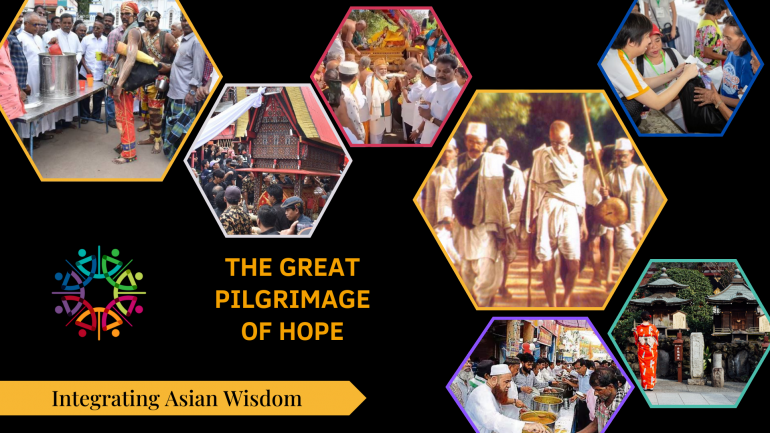Integrating Asian Wisdom: The Great PIlgrimage of Hope

As the Church in Asia looks toward the Great Pilgrimage of Hope assembly in Penang, Malaysia, from November 27 to 30, 2025, we are called to reflect not only on our common faith but on the very soil upon which that faith is planted.
Over a thousand bishops, priests, religious, deacons, and lay leaders will gather, united by a profound question: How can we, as Asian Catholics, live our identity in ways that resonate with the rich cultural heritage and diverse traditions of our continent?
The answer is found not in adopting external strategies, but in affirming the deeply dialogical nature of the Asian Church itself.
Asia: A Pluralistic Gift
Asia is the cradle of the world's great spiritual traditions, Buddhism, Hinduism, Islam, and countless Indigenous faiths. For the Western mind, this deep pluralism might appear as a challenge, a fractured landscape requiring confrontation or conversion. For us, the Catholic community of Asia, this mosaic of cultures and religions is, first and foremost, a gift.
This reality demands a specific form of mission: one that recognizes the presence of God’s grace and truth already seeded throughout our cultures. To be a Christian in Asia means living in perpetual encounter; it means witnessing to Christ not through dominance, but through quiet, compassionate presence and shared humanity.
We are not called to tear down the cultural structures that sustain our neighbours, but to offer the saving grace of Christ within the context of their deepest cultural aspirations for peace, harmony, and community.
The Theological Path: Dialogue of Life
The foundation for this dialogical identity is rooted in the very heart of the Gospel, the mystery of the Incarnation. God chose not to confront the world from a distance but to enter fully into human reality.
The most effective way of being Church in Asia is often the Dialogue of Life, the quiet witness of Catholics living their values authentically in daily life alongside people of other faiths. This dialogue is not a theological debate; it is mutual presence in the marketplace, the neighbourhood, and the shared joy and suffering of life.
This is realized in everyday moments:
-
Shared Social Action: Working side-by-side with Buddhist, Muslim, or Hindu neighbours to protect a local environment or provide relief after a flood. In these moments of shared service, the unconditional love of Christ becomes visible through action, not simply words.
-
Interreligious Friendships: The deep, respectful friendships forged between Catholic families and families of other faiths, celebrating each other’s feasts, mourning each other’s losses. These relationships affirm a sacred space of mutual respect, where difference is honoured and common humanity is cherished.
-
Presence over Proselytism: The simple act of living a visibly prayerful, ethical, and generous life becomes the most persuasive testimony. This is a faith that seeks harmony, not conquest.
Asian Wisdom: Pathways to the Gospel
The cultural heritage of Asia offers profound ethical and communal frameworks that serve as natural pathways toward Gospel values. To truly be Asian and Catholic, we must learn from these traditions:
-
Filipino Pakikipagkapwa: This concept emphasizes "shared identity" or "seeing the self in the other." It is a moral obligation to treat everyone as a fellow human being. This beautiful expression of solidarity mirrors the Christian call to unconditional love for our neighbour and seeing the imago Dei in all people.
-
Indonesian Gotong Royong: Signifying mutual cooperation and communal burden-sharing, Gotong Royong is a core principle of community life. This spirit of collective action provides a powerful model for the Church's social teachings, where the Body of Christ actively participates in building the common good alongside the wider community.
-
Japanese Wa: Meaning harmony and peaceful unity, Wa guides social interaction to ensure smoothness and avoid confrontation. For the Church, this challenges us to approach differences, whether theological, political, or social, with reverence, always seeking understanding and reconciliation.
-
Indian Satyagraha: While deeply associated with Mahatma Gandhi, Satyagraha, meaning "truth force" or non-violent resistance rooted in moral witness, is an ethical system that resonates with the Christian understanding of justice, peace, and overcoming evil with good.
By embracing these cultural virtues, we reveal the universality of Christ’s message. We demonstrate that the love of God is already woven into the fabric of Asian life, waiting to be affirmed and brought to completion.
A Call to Walk Together in Hope
The Great Pilgrimage of Hope in Penang is an invitation to deepen this commitment. It calls us to affirm, as one continental Church, that our future is shared with our neighbours of all faiths.
The challenges we face, poverty, political instability, environmental crisis, and religious intolerance, cannot be solved in isolation. They require us to “walk together in hope,” across every religious and cultural dividing line.
This is the Asian way of being Church: a Church that is humble, empathetic, and present; a Church that offers its resources and its heart in service to the continent.
As we prepare for the assembly, let us commit to being authentic missionary disciples who know that the most powerful witness we can give is to offer an unconditional, compassionate presence that reflects the boundless love of God for all people.
In Asia’s mosaic, the Catholic faith shines brightest when it is held in harmony with the diverse beauty that surrounds it.










- Reply
Permalink